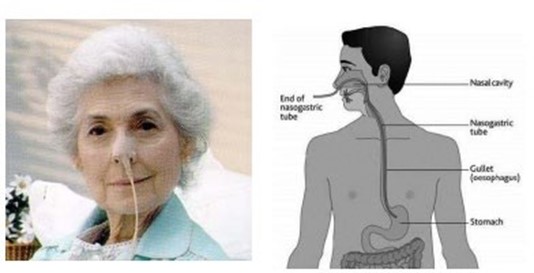A patient admitted with a peptic ulcer has a nasogastric (NG) tube in place. When the patient develops sudden, severe upper abdominal pain, diaphoresis, and a firm abdomen, which action should the nurse take?
Irrigate the NG tube.
Elevate the foot of the bed.
Give the ordered antacid.
Check the vital signs.
The Correct Answer is D
The nurse should quickly assess the patient's vital signs to check for signs of shock and instability. If the vital signs are unstable, the nurse should initiate appropriate interventions to stabilize the patient, such as administering oxygen, starting IV fluids, and providing continuous cardiac monitoring. Based on the sudden onset of severe upper abdominal pain, diaphoresis, and a firm abdomen, the nurse should suspect a possible perforation or bleeding related to the peptic ulcer. This is a medical emergency that requires immediate intervention. Therefore, the nurse should prioritize notifying the healthcare provider and preparing the patient for urgent medical evaluation.
Option A, irrigating the NG tube, is not appropriate in this situation and may further exacerbate the patient's condition if the ulcer has perforated.
Option B, elevating the foot of the bed, is also not appropriate as it does not address the patient's current symptoms.
Option C, giving the ordered antacid, may not be effective in addressing the severity of the patient's symptoms and should be postponed until the healthcare provider has evaluated the patient.

Nursing Test Bank
Naxlex Comprehensive Predictor Exams
Related Questions
Correct Answer is A
Explanation
In acute adrenal insufficiency, also known as Addison's disease, the adrenal glands are unable to produce enough cortisol and aldosterone hormones. These hormones play an important role in regulating sodium and potassium levels in the body. Therefore, a patient with acute adrenal insufficiency may have low sodium and high potassium levels in their blood.
The goal of therapy is to replace the deficient hormones and normalize the electrolyte levels in the body. If the current therapies are effective, the nurse would expect to see an increase in the patient's serum sodium levels because of aldosterone replacement therapy. Therefore, option a is the correct answer.
Decreasing serum chloride levels and decreasing blood glucose levels are not directly related to the treatment of acute adrenal insufficiency. In fact, a patient with acute adrenal insufficiency may have low serum chloride levels and low blood glucose levels due to the lack of cortisol hormone.
Increasing serum potassium levels would be an indicator of ineffective treatment or inadequate aldosterone replacement therapy, as aldosterone helps to regulate potassium levels in the body.
Correct Answer is B
Explanation
Since the patient's pre meal blood sugar is 311 mg/dL, according to the sliding scale, the patient requires 8 units of Humalog insulin. Therefore, the nurse should administer 8 units of Humalog insulin before the patient's meal. It is important to note that if the patient's blood glucose level is greater than 400 mg/dL, the nurse should call the MD instead of administering insulin. Keeping the patient NPO (nothing by mouth) is not necessary in this situation, as the patient is awake, alert, and able to swallow, and will require their meal for adequate nutrition. However, it is important to monitor the patient's blood glucose level after administering insulin and adjust the dosage if necessary.
Whether you are a student looking to ace your exams or a practicing nurse seeking to enhance your expertise , our nursing education contents will empower you with the confidence and competence to make a difference in the lives of patients and become a respected leader in the healthcare field.
Visit Naxlex, invest in your future and unlock endless possibilities with our unparalleled nursing education contents today
Report Wrong Answer on the Current Question
Do you disagree with the answer? If yes, what is your expected answer? Explain.
Kindly be descriptive with the issue you are facing.
